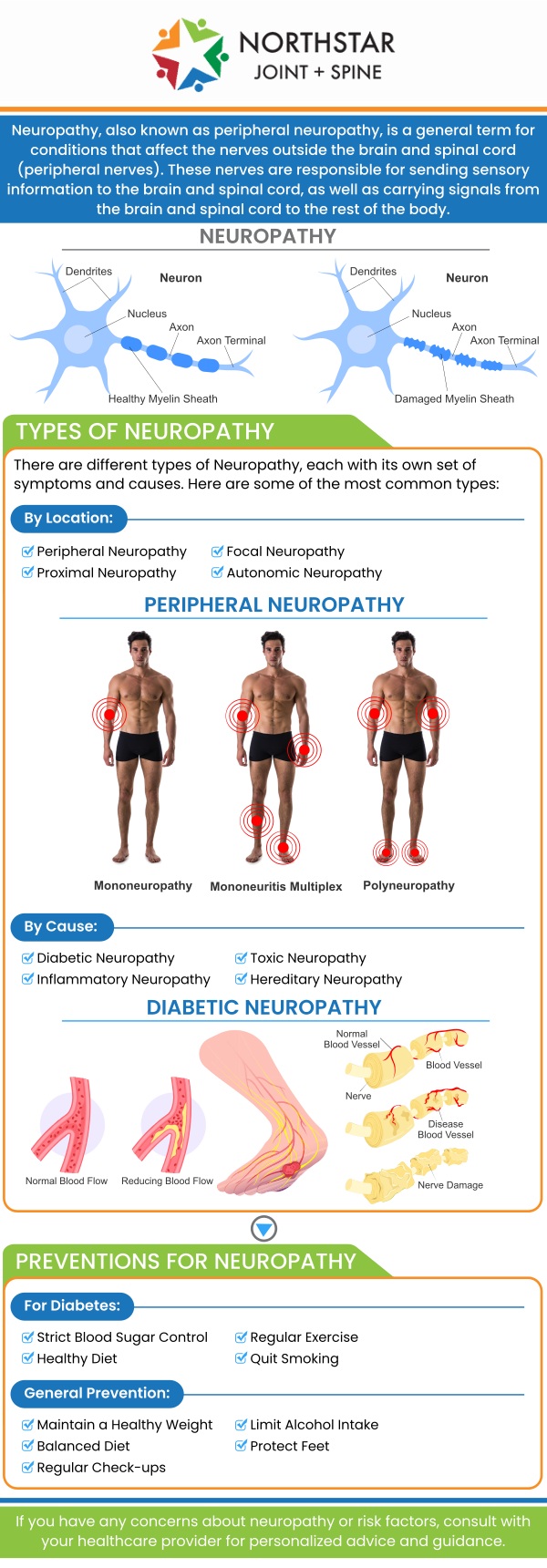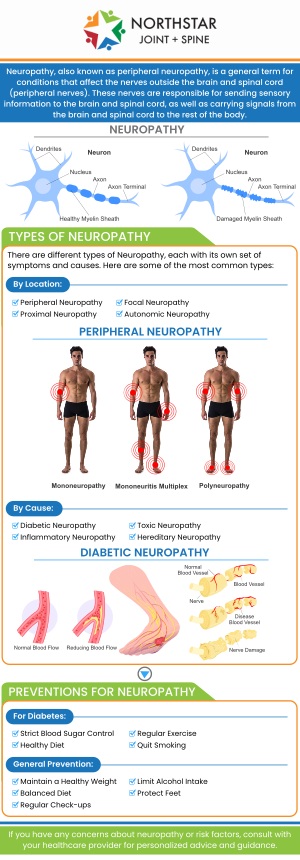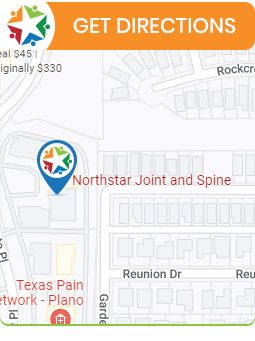Severe Neuropathy in Legs and Feet Without Diabetes or Alcohol Use Q&A
Severe neuropathy in the legs and feet without diabetes or alcohol use may result from conditions like vitamin deficiencies, autoimmune diseases, infections, or nerve compression. Symptoms can include intense burning, numbness, tingling, or muscle weakness. Board Certified Dr. Robert J. Nocerini, MD, at Northstar Joint and Spine, provides thorough evaluations to identify underlying causes and develop targeted treatment plans. For more information, contact us today or schedule an appointment online. We are conveniently located at 7704 San Jacinto Pl Suite #200 Plano, TX 75024.


Table of Contents:
What causes severe neuropathy in legs and feet without diabetes or alcohol use?
Can nerve damage in the legs and feet happen without diabetes?
Can severe neuropathy occur due to an autoimmune condition?
How is neuropathy diagnosed when diabetes and alcohol are not factors?
Advanced Care for Severe Neuropathy in Legs and Feet with Dr. Robert Nocerini in Plano, TX
When diabetes and alcohol use are not present, severe neuropathy in the legs and feet can still occur due to a wide range of other underlying causes. In some individuals, the root issue may be related to a vitamin deficiency, particularly B vitamins, which are essential to nerve health. Others may develop neuropathy as a result of medication side effects, especially certain chemotherapy drugs or prolonged use of medications known to interfere with nerve function.
There are also cases where infections, whether viral or bacterial, are linked to nerve damage. In addition, metabolic disorders and kidney dysfunction have been known to impact the nerves in the legs and feet, particularly when waste products build up in the blood and begin to affect nerve tissue.
In some situations, neuropathy may occur without a clear cause at all. The specialists at Northstar Joint and Spine often evaluate a patient’s overall health history and lifestyle in order to narrow down the potential contributors and create a targeted approach for managing symptoms effectively.
Diabetes is one of the most commonly known causes of nerve damage, but there are many other potential causes. Nerve fibers in the legs and feet can become impaired due to poor circulation, autoimmune responses, or as a consequence of chronic inflammation. Over time, these issues can limit the nerves’ ability to send and receive signals correctly, leading to a gradual onset of burning pain, tingling, or muscle weakness. Occupational or repetitive stress on the lower limbs can also place strain on the peripheral nerves. Compression from prolonged sitting, spinal disc issues, or anatomical pressure points may lead to symptoms that mimic more systemic forms of neuropathy. Overuse or misalignment often plays a role in how nerve signals are disrupted in the feet and legs. Certain genetic conditions may also cause peripheral nerves to degenerate or function abnormally. In these cases, the symptoms may show up in early adulthood or gradually worsen with age. Evaluation by specialists, including diagnostic imaging and nerve testing, can help identify the presence and extent of the damage even in the absence of diabetes or other well-known contributors.
There are several autoimmune disorders that can lead to severe neuropathy. When the immune system mistakenly targets nerve tissue, inflammation and damage can occur, disrupting communication between the brain and the extremities. Conditions like lupus, rheumatoid arthritis, and more have all been linked to peripheral neuropathy in some patients. In other cases, the immune system may target the protective coverings of nerves. This can slow or block nerve signals and lead to profound weakness, sharp pain, or loss of coordination in the lower limbs. For some, this process progresses slowly, while in others, the symptoms may worsen quickly over a matter of weeks.
Proper diagnosis often depends on a combination of lab testing, physical exams, and additional testing such as diagnostic nerve blocks. The specialists at Northstar Joint and Spine may also collaborate with other providers to ensure the underlying autoimmune condition is being addressed alongside the nerve pain. Treatment typically involves managing the immune response while also focusing on pain control and improving daily function.
When diabetes and alcohol are not involved, diagnosing neuropathy can take a more investigative approach. Pain management specialists at Northstar Joint and Spine, including Dr. Robert J. Nocerini, often begin with a detailed review of symptoms and any patterns related to time of day, activity level, or progression over time. This is followed by a physical exam to assess strength, reflexes, and sensation in the feet and legs. Subtle changes in skin temperature or muscle tone can also provide clues.
Blood work is typically ordered to rule out nutritional deficiencies, thyroid dysfunction, autoimmune markers, and other systemic issues. If results are inconclusive, further testing like nerve conduction studies and electromyography may be recommended to evaluate how well signals are moving along the affected nerves. These tests can help determine both the type and severity of nerve involvement.
Imaging of the spine or extremities may also be helpful in identifying whether compression or degeneration is playing a role. Interventional techniques, including diagnostic nerve blocks may be ordered as needed as well. For individuals without clear risk factors, diagnosis can take time, but identifying the root cause whether it be inflammatory, metabolic, or mechanical helps to inform a treatment plan tailored to the root cause of the condition.
Board-Certified Dr. Robert Nocerini at Northstar Joint and Spine offers advanced solutions for severe neuropathy in the legs and feet, particularly for patients without diabetes or alcohol-related causes. His diagnostic approach helps uncover underlying conditions such as nerve compression, nutritional imbalance, or autoimmune disorders, allowing him to craft precise and results-driven treatment strategies.
Dr. Nocerini utilizes evidence-based methods to reduce tingling, numbness, and burning sensations associated with neuropathy. His patient-focused care aims to improve nerve health, comfort, and stability. By combining clinical expertise with compassionate care, Dr. Nocerini helps patients regain function and confidence in their day-to-day life.
For more information, contact us today or schedule an appointment online. We are conveniently located at 7704 San Jacinto Pl Suite #200 Plano, TX 75024. We serve patients from Plano TX, Willow Bend TX, Frisco TX, Allen TX, Addison TX, North Dallas TX, and surrounding areas.

Check Out Our 5 Star Reviews


Additional Services You May Need
▸ Back Pain
▸ Shoulder Pain
▸ Chronic Pain
▸ Epidural Steroid Injections
▸ Spinal Cord Stimulation
▸ Viscosupplementation
▸ Genicular Nerve Blocks
▸ Facet Injections
▸ Joint Injections
▸ Sacroiliac Joint Injections
▸ Lumbar and Cervical
▸ Facet Medial Branch Blocks
▸ Diagnostic Nerve Blocks
▸ Medication Management
▸ Neck Pain Doctor
▸ Diabetic Peripheral Neuropathy
▸ Headaches
▸ Suboxone
▸ Peripheral Nerve Stimulation
▸ Spine
▸ Joints
▸ Muscles
▸ Bones

Additional Services You May Need
▸ Back Pain
▸ Shoulder Pain
▸ Chronic Pain
▸ Epidural Steroid Injections
▸ Spinal Cord Stimulation
▸ Viscosupplementation
▸ Genicular Nerve Blocks
▸ Facet Injections
▸ Joint Injections
▸ Sacroiliac Joint Injections
▸ Lumbar and Cervical
▸ Facet Medial Branch Blocks
▸ Diagnostic Nerve Blocks
▸ Medication Management
▸ Neck Pain Doctor
▸ Diabetic Peripheral Neuropathy
▸ Headaches
▸ Suboxone
▸ Peripheral Nerve Stimulation
▸ Spine
▸ Joints
▸ Muscles
▸ Bones






